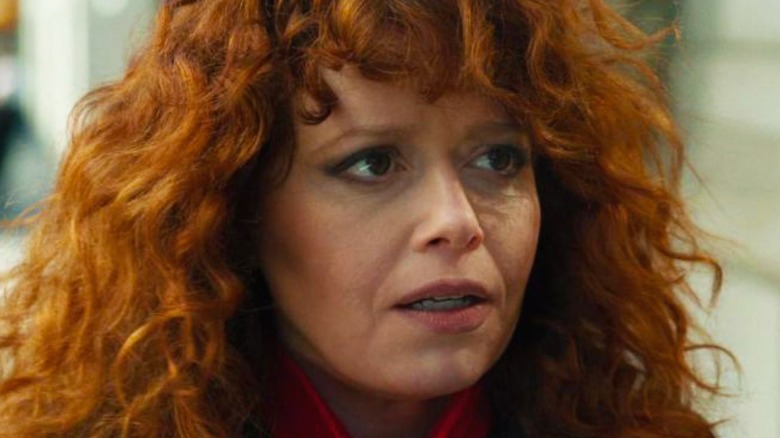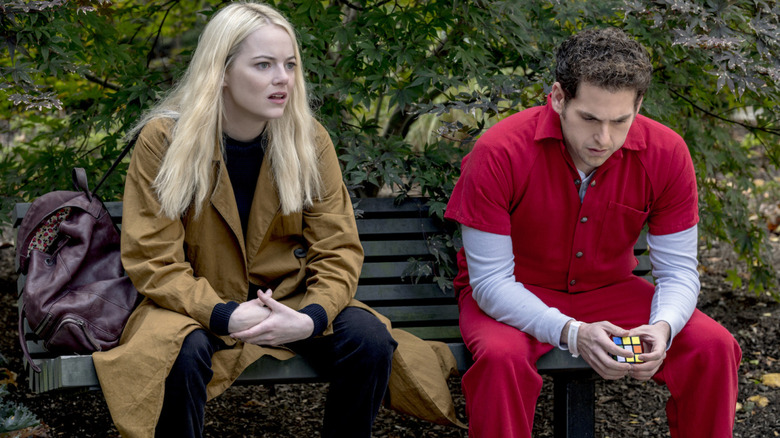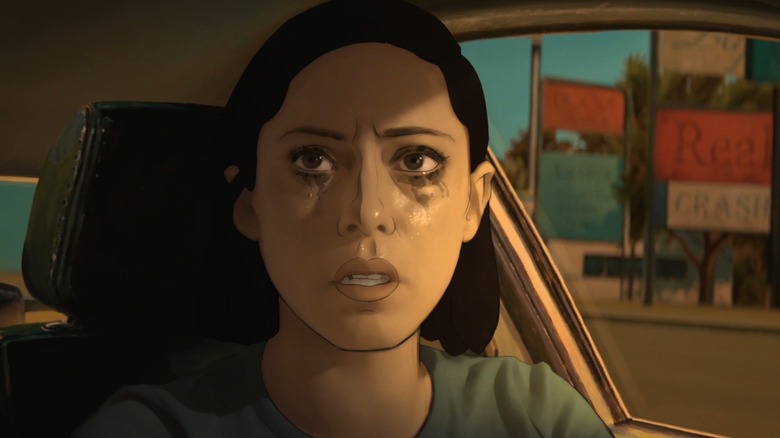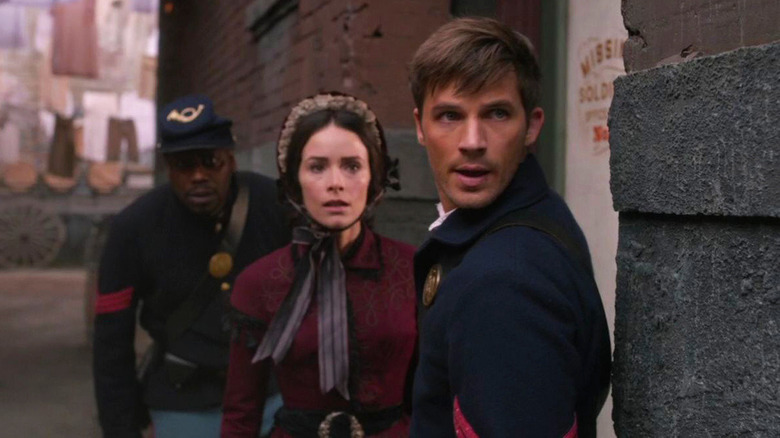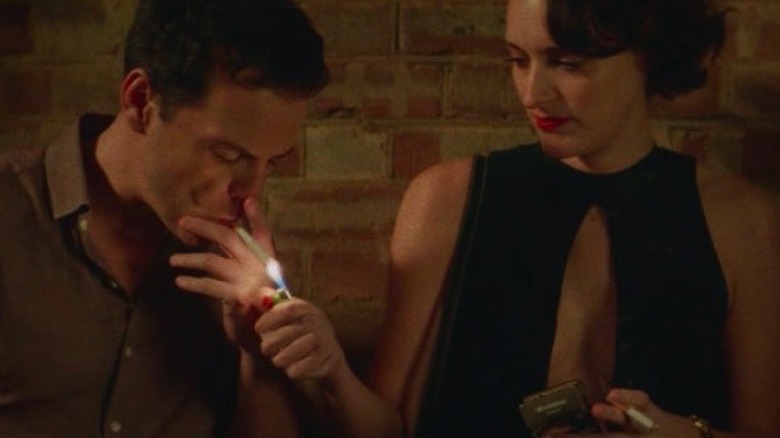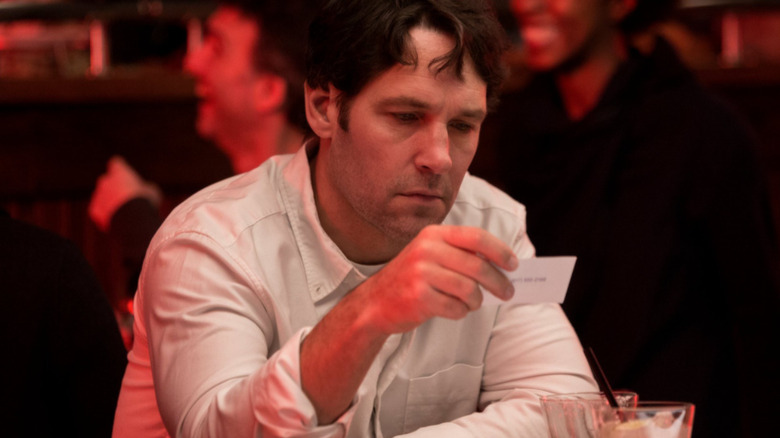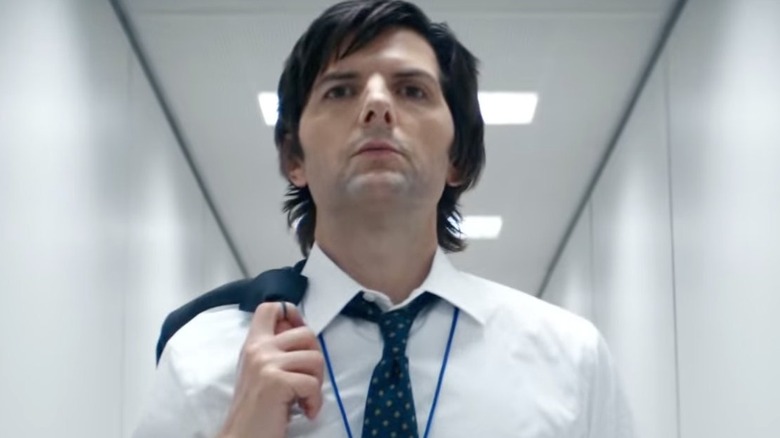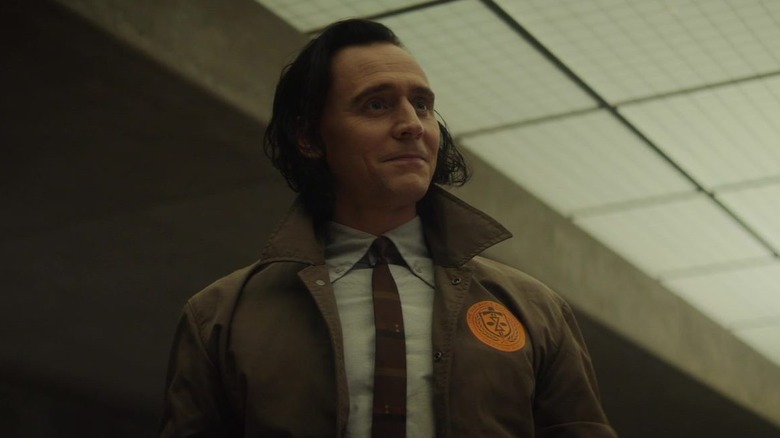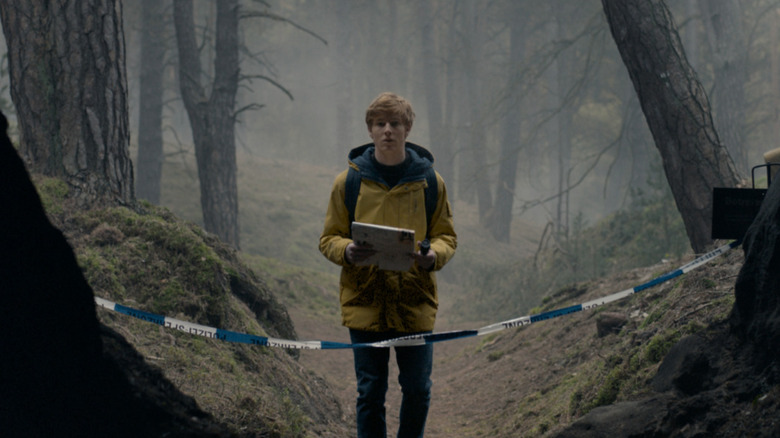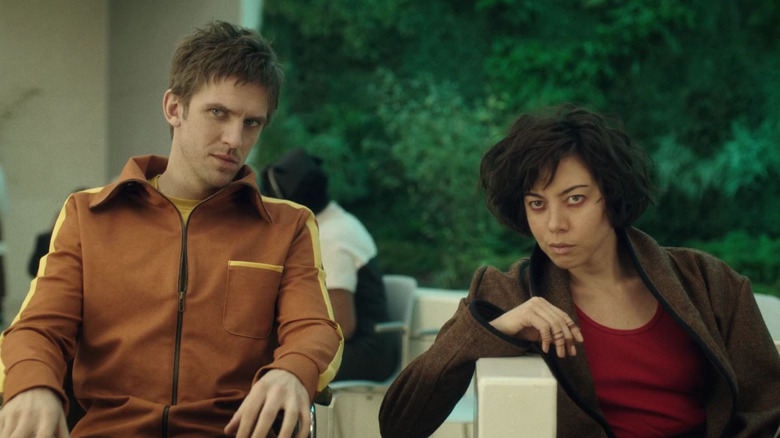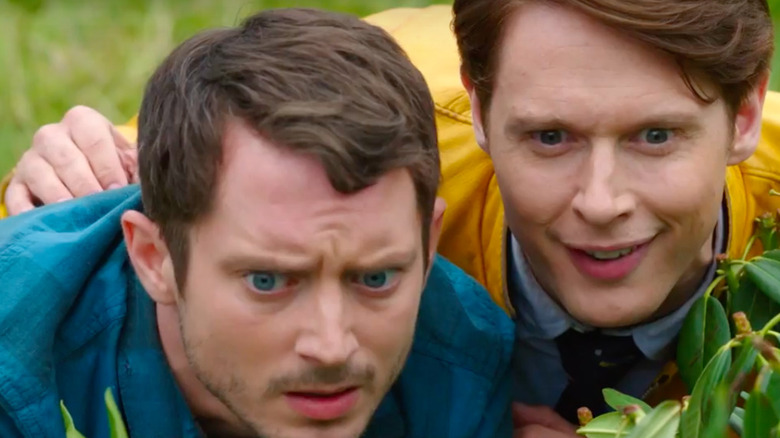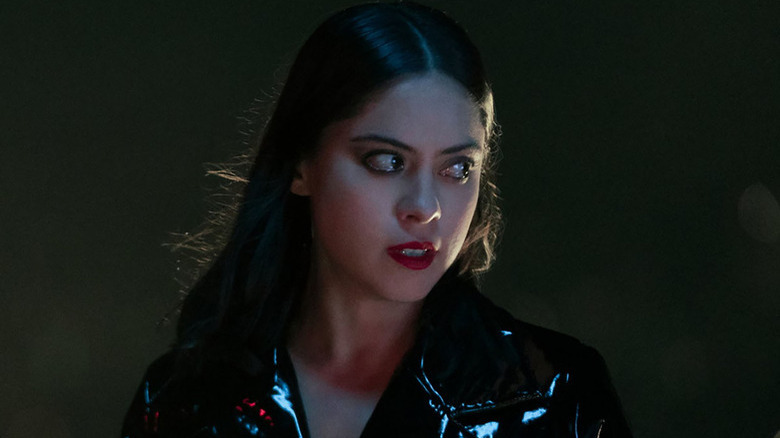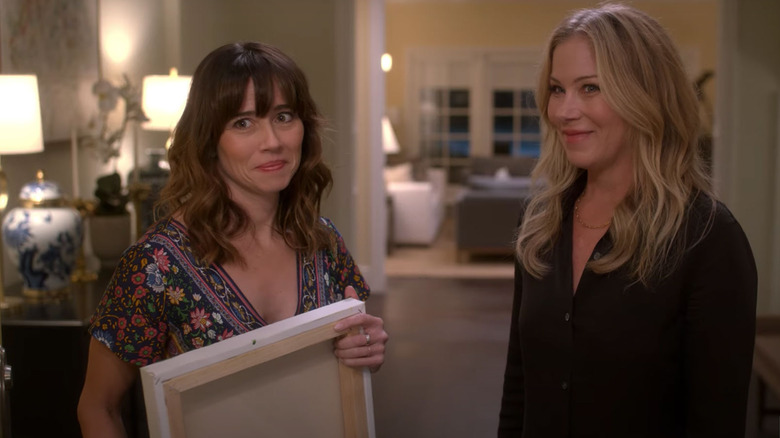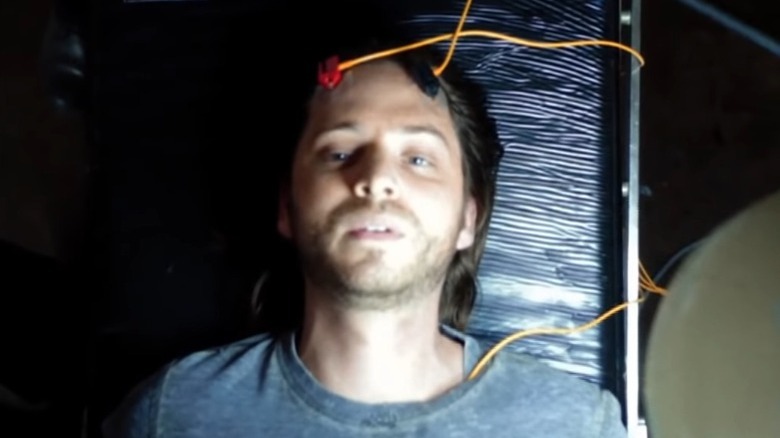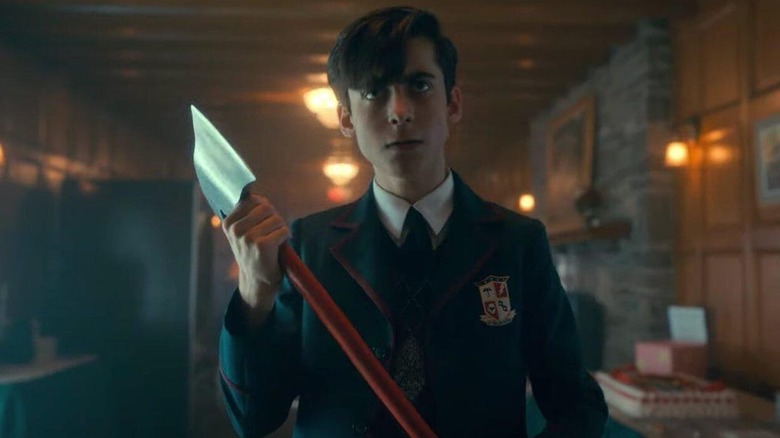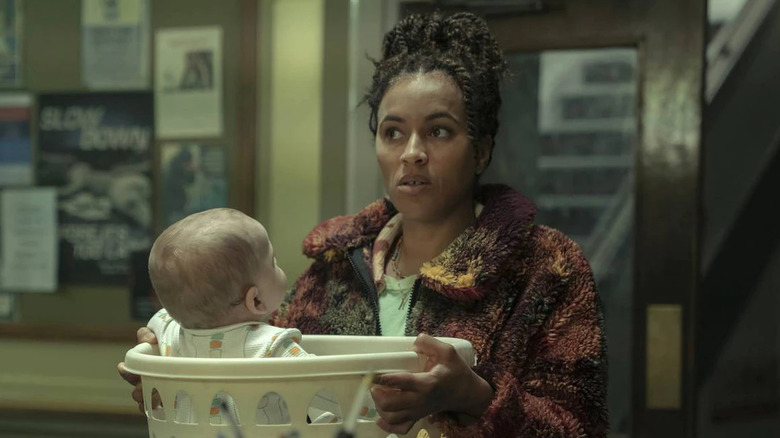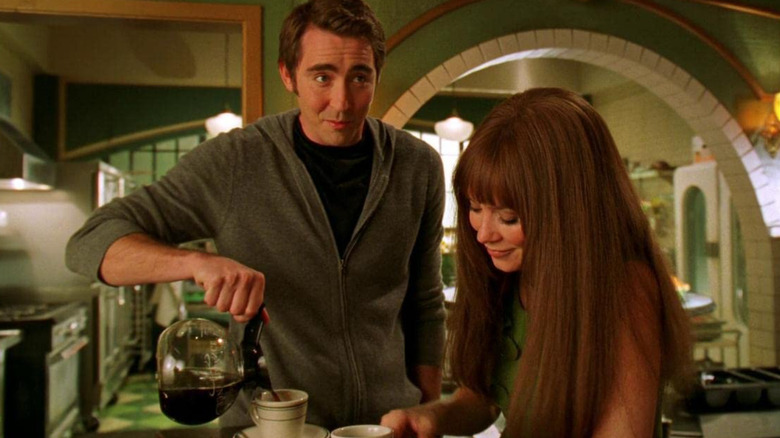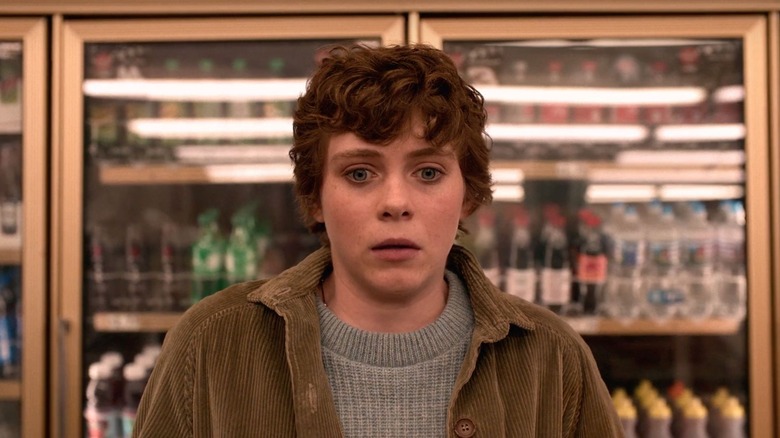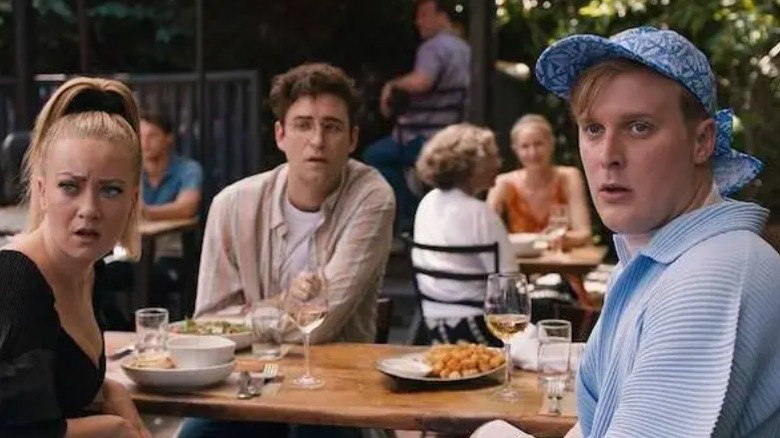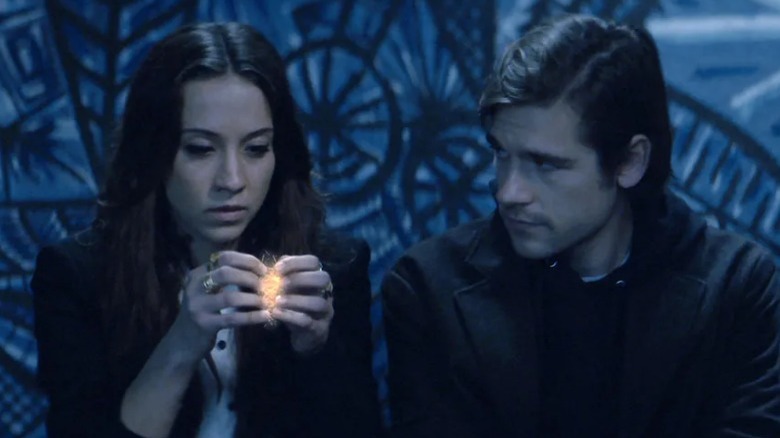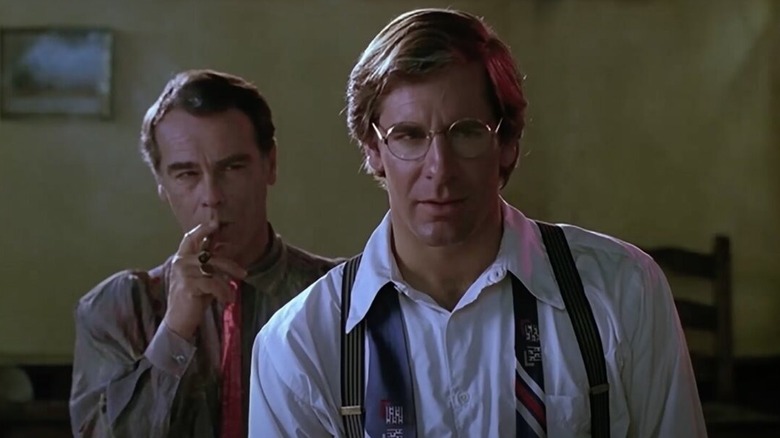20 Shows Russian Doll Fans Should Watch
There are many ways to describe the ridiculously binge-able "Russian Doll," created by Natasha Lyonne, Leslye Headland, and Amy Poehler. It's a dark dramedy filled with cheeky dialogue and sharp, "Gilmore Girls"-esque wit. It's an emotionally complex existential comedy. It's a character-focused drama exploring different kinds of grief and loss. It's playful, imaginative, and visually stunning, but it can also be bleak, gritty, and haunting.
The first season is a horror-laced time loop story that brings together two strangers, Nadia (Lyonne) and Alan (Charlie Barnett), who learn the importance of helping each other (and others). However, the second season is a time-traveling jaunt that delves into these characters' complex familial relationships to teach them how to accept what can't be changed. At its very core, according to Vox's Terry Nguyen, "Russian Doll" is "about trauma — how it manifests, festers, and embeds in its characters' lives — and the possibility of healing these deep-seated wounds."
The fact that our charismatic star has a mesmerizing swagger and a magnetic onscreen presence is just the cherry on top of this very rich and colorful ice cream sundae.
With just two short seasons, it's easy to wonder what you're going to fill the void with once you've finished your binge — but that's what we're here for! For "Russian Doll" fans everywhere, we offer this collection of like-minded shows — from time-traveling dramas to dark dramedies to science fiction thrillers to horror comedies and more — that are worth checking out next.
Maniac
Loosely based on the Norwegian television series of the same name and starring Emma Stone and Jonah Hill, the American science fiction hit "Maniac" offers its viewers a dark, complex (but incredibly fun) psychological dramedy. The series revolves around two characters — Annie (Stone) and Owen (Hill) — whose minds and worlds collide via a trippy pharmaceutical drug trial courtesy of a Japanese-backed company known as Neberdine Pharmaceutical Biotech. Both characters are using the trial to cope with — and also, to some degree, avoid — their own horrible truths. According to Variety's Daniel D'Addario, this psyche-focused narrative "plunges viewers into a fictional world that's both divergent from our own and instantly recognizable — and then reinvents itself several times over, skittering across time, space, and genre to tell a story of connection that feels urgent and deeply, painfully human."
Sounds familiar, right? "Russian Doll" also traverses time and space (in an even more literal sense), and the horror-laced time loop trope of the first season transforms into a surrealist time-traveling jaunt in the second. The genre pivots in "Maniac" are much wider and vaster, even stretching into fantasy epic territory. However, in the same way that Nadia and Alan are brought together to help each other with their personal struggles, so too are Annie and Owen.
All in all, we wholeheartedly agree with Reddit user u/andreabbbq when it comes to their proclamation that both shows share "a similar vibe, similar moral," and ultimately, a "similar pattern."
Undone
Time travel? Check. Humor? Check. A trippy, mind-bending narrative featuring a female protagonist stuck in a seemingly hopeless rut? Also check. "Undone" follows Alma (Rosa Salazar), a woman whose life is thrust into chaos after a traumatic car accident in which she runs a red light upon seeing her father standing on the side of the road. The thing is, her father died twenty years prior. Afterward, as Alma recovers, reality starts to get weird. Like her dead dad recruiting her help in finding out the truth about his death and her discovering the ability to travel through time kind of weird.
Reddit user u/Ajna_Magik compares the show to "Russian Doll" because "There's a similar vibe with the whole numerous timeline/childhood trauma aspect," and because "the lead female characters have that whole 'selfish, self destructive, don't call me crazy' energy going on." Essentially, if you're looking for another character-focused exploration of grief and trauma, you needn't look any further.
One thing to note: the unique rotoscoping technique employed here isn't for everyone. In fact, it can be a little jarring because of how "uncanny valley" it is. However, if you can get used to it, you'll find an emotionally layered, psychological dramedy more than worthy of any "Russian Doll" fan's attention. To give you a clearer sense of what we mean regarding the animation style, here's a teaser trailer from YouTube. If you're like us and still sold after watching, we'd say you're in for a real treat!
Timeless
In NBC's science fiction show, "Timeless," we follow a small team consisting of Professor Lucy Preston (Abigail Spencer), Master Sergeant Wyatt Logan (Matt Lanter), and engineer Rufus Carlin (Malcolm Barrett). These characters are tasked with stopping the man who stole an experimental time machine from changing history (and thus the world as they know it). In the first episode, the trio finds themselves in 1937, presumably, Lucy surmises, to thwart their thief before he makes moves to destroy the United States from the past. However, we realize soon enough that this man's significant, universe-altering theft — and the roles our characters play in all of this — is a lot more complicated.
One Redditor, responding to a "Timeless" fan's post requesting new television recommendations, suggests "Russian Doll," pointing out how both shows feature "Time and space themes" and that each series "makes you think along and craft theories." The characters in these respective narratives are thrust into things they don't understand, and we follow them as they attempt to make sense of one exceptionally confusing universe. Not only that, but all these characters must also deal with notable disparities in their worlds — for Nadia and Alan in the first season of "Russian Doll," that means dealing with the eerie, gradual disappearance of objects and people as the time loop rages on. For characters like Lucy in "Timeless," that means grappling with the knowledge that her sister no longer exists and that she's engaged to someone she doesn't actually know.
Fleabag
Adapted from Phoebe Waller-Bridge's one-woman show, the streaming smash hit "Fleabag" follows an unnamed lead with a free spirit and a voracious sexual appetite who is only ever known to viewers as Fleabag (played, of course, by Waller-Bridge). Full of sarcasm, wit, and a veneer of nonchalance, Fleabag is coping with life after the sudden death of her best friend and business partner, Boo. In just the first episode, we see our protagonist engaging in casual one-night stands, getting denied a bank loan in her efforts to keep the café she once operated with Boo open and fighting with her straight-laced sister, Claire (Sian Clifford). Throughout the series, we also see Fleabag frequently demonstrating her very clear disdain for her godmother-turned-stepmother (Olivia Colman) and, perhaps most notably, sharing some romantically-charged chemistry with a priest (Andrew Scott).
While there's no supernatural slant or horror-laced content here, we do get to enjoy a quippy protagonist who constantly breaks the fourth wall, providing the audience with pointed looks and wry commentary. However, the real reason we liken "Fleabag" to "Russian Doll" is that Redditors like user u/AlvinTaco believe these two shows "are the best televised representations of grief and trauma that exist." Like "Russian Doll," this quirky British gem is a dramedy that features a sometimes abrasive but always charismatic female lead who, like Nadia, is trying to process — and perhaps even overcome and learn from — her own trauma.
Living with Yourself
In our opinion, the one-season, Paul Rudd-starring "Living with Yourself" is, at times, just as clever as "Russian Doll." Here, depressed copywriter Miles Elliot (Rudd) has reached a soul-crushing plateau in life. He can't seem to get ahead in his career, and he and his wife Kate are struggling to conceive. So, naturally, when Miles witnesses a co-worker turning his life around, suddenly becoming more successful in the workplace and happier in his personal life, Miles has to know the secret behind the abrupt transition. From there, he's led to Top Happy Spa, where he spends all the family's savings for a chance at a new start — only to wake up in a shallow grave, trek home, and find his wife with another version of himself — his very expensive clone.
Like Alan and Nadia, Miles begins his journey toward self-realization and self-acceptance with a traumatic death. However, rather than being stuck in a horrendous time loop, he's trapped in a terrifying reality in which he paid a shady organization just so they could clone him, try to kill him, and replace him with a "better" version of himself.
In one Reddit thread where a user asks for suggestions on what to watch after "Russian Doll," another user, u/mit007007mit, responds with "Living with Yourself," citing that it's "similar in a sense it's an existential comedy sci-fi, but this one features not one but two great performances by Paul Rudd." And who doesn't love Paul Rudd?
Severance
According to several Redditors, Ben Stiller's bizarre but compelling "Severance" is another show with "Russian Doll" vibes. In this psychological science fiction thriller, we're introduced to Lumon Industries, a creepy tech corporation that puts its employees through freakish, "Black Mirror" levels of surveillance and control. Some workers even undergo a medical procedure in which their work memories and non-work memories are separated, splitting them into two versions of themselves. Post-op, each severed employee has a "work" version that only exists inside the office and an "outie" version that exists solely in the outside world.
The narrative begins with newly-hired (and newly severed) Helly (Britt Lower) struggling to settle into the Macrodata Refinement division as her co-worker, Mark (Adam Scott), receives a sudden, unforeseen promotion to head of the division in the wake of another co-worker's departure. We soon discover that Mark, too, has undergone the severance operation, and we meet the version of him that's a former professor still grieving the death of his wife. Things only get more complicated — and more horrific — from there. New hire Helly finds herself mentally deteriorating when her attempts to communicate with her "outie" counterpart fail and her resignation request is denied. Meanwhile, Mark, prompted by a cryptic note from a man claiming to be his former co-worker (the man he's just replaced, in fact), is set on a path toward unraveling the dark mysteries and sinister truths surrounding his place of work.
Loki
In the second season of "Russian Doll," Nadia fractures time by attempting to carry the baby version of herself from the past to the present using the subway. In "Loki," the god of mischief (played, of course, by the dazzling Tom Hiddleston) fractures time by stealing the Tesseract in "Avengers: Endgame."
Plucked from time and space and brought to the Time Variance Authority, an organization tasked with "protecting the proper flow of time," this version of Loki is forced to stand trial for his sins. After being confronted with his violent and malicious past in the Time Theater, he's given a choice: be obliterated from all of existence or help restore and preserve the "Sacred Timeline." Honestly, the Asgardian trickster's not keen on either option, but with guidance from TVA agent and mentor Mobius M. Mobius (Owen Wilson), he reluctantly agrees to help hunt down another time-disrupting variant who calls herself Sylvie (Sophia Di Martino).
To The Verge's Andrew Webster, the first season of "Loki" is "an excellent piece of science fiction" in which "Hiddleston adds a depth to Loki that we haven't seen yet" Beyond that, the actor has "magnetic chemistry with both Wilson and Di Martino." Similar to "Russian Doll" in that it features rich, complex characters who are forced to confront their dark pasts as they ponder the current trajectories of their lives, "Loki" sees our title character contending with his own existential crisis. That, in our opinion, is what makes this one worth the watch.
Dark
The German science fiction series "Dark" is definitely one to add to your queue if you're a "Russian Doll" fan who can't get enough mind-bending, time-warping content — even more so if you love deep, unwieldy, rabbit-hole mysteries. Whereas each season of "Russian Doll" is akin to a satisfying short story with its own rich, complicated, and humorous arc, "Dark" is akin to a bleak, sprawling, and poignant epic where time is a vast, messy, and intricate web.
Still, it's worth noting that both shows are equally concerned with exploring our characters' relationships with time, pondering existential themes, and dissecting multigenerational trauma. Just remember that "Russian Doll" is quite a bit lighter in tone when compared to this dense and expansive sci-fi drama.
"Dark" focuses on four families living in the town of Winden — the Kahnwalds, the Nielsens, the Tiedemanns, and the Dopplers — who find themselves at the center of a time-traveling conspiracy that involves kids who've disappeared over several decades. While the narrative slowly unravels, we learn of these families' broken relationships, past secrets, and disturbing truths. It all adds up to one intense, confusing, but incredibly compelling saga.
If you do decide to check out "Dark" — which you should — we strongly suggest watching it in its original German with subtitles turned on. While there's an English dubbed version, and while that's what Netflix will default to, live-action dubs can often be distracting — especially when paired with a show as complex as this.
Legion
The darkly humorous "Legion" follows David Haller — aka Charles Xavier's son Legion – as his expansive powers gradually propel him into madness and villainy. David (Dan Stevens) is diagnosed with schizophrenia at a young age and committed to a psychiatric facility as an adult. However, he hasn't come to terms with the fact that his life-long mental struggles are largely due to some super-destructive abilities and a sinister threat buried deep inside his mind. Whether he's ready to accept these truths or not, David soon finds himself in the crosshairs of both a government agency called Division 3 and a team of superpowered mutants.
Like "Russian Doll," this whimsical, mind-bending tale isn't afraid to blend or play with genre. It's not afraid to grapple with dark themes or lace its storylines with horror while exploring themes of trauma and self-isolation. And it's definitely not afraid to further complicate everything by throwing time travel into the mix.
The Guardian's Emily Zemler writes, "At its core, 'Legion' is about not feeling at home in your own brain, an idea that translates itself beyond David's character. The show asks the viewer to consider the importance of embracing who you are inherently and moving forward with those particular strengths and weaknesses." Isn't that, to some degree, what "Russian Doll" is all about, too?
Bonus: fans of Nadia's casual swagger will almost certainly enjoy Aubrey Plaza as the magnetic, but admittedly unhinged, Lenny.
Dirk Gently's Holistic Detective Agency
Zany and criminally under-watched, "Dirk Gently's Holistic Detective Agency" depicts the trippy adventures of a very Doctor-like "holistic detective." Dirk (Samuel Barnett) recruits bellhop Todd (Elijah Wood) and security officer Farah (Jade Eshete), convincing them to help him solve cases that involve the interconnectivity of everything. The thing is, Dirk's mystery-solving methods are absurd and unconventional.
Basically, Dirk just follows vibes and feelings while waiting for fate to step in and either hand him clues or lead him to where he needs to go. What's even more stunning is that these seemingly passive tactics still manage to invite a surprising amount of chaos. On top of that, reluctant accomplice Todd soon learns that Dirk might have connections to a secret CIA operation called "Project Blackwing." On top of that, there's a sociopath who describes herself as a "holistic assassin" out there, just waiting for the universe to take her to Dirk so she can murder him. Add some time travel into the mix, and you're in for one insanely imaginative ride.
One Redditor, responding to a post looking for shows similar to "Dirk Gently's Holistic Detective Agency," points to "Russian Doll," arguing that "the slow unraveling of the story" gives both shows similar structures. Another user on the same thread agrees, calling both shows "weird, kinda funny, surreal." All that is to say, "Dirk Gently" is another mind-bending sci-fi show featuring characters who stumble into bizarre situations while grappling with trauma and existential crises.
Brand New Cherry Flavor
The A.V. Club's Tatiana Tenreyro remarks that, because "Netflix gave us a TV show featuring someone puking cats last year" — that's this one, by the way — "it was about time for an extra dose of weirdness with the return of 'Russian Doll.'" But the shared weirdness isn't the only reason the miniseries "Brand New Cherry Flavor" makes our list. As Reddit user u/zero0n3 notes in their response to u/LunaDaTuna's request for like-minded television, this horror gem and "Russian Doll" share a "similar cinematography style and flavor."
Here, Rosa Salazar plays Lisa N. Nova, an aspiring director who dreams of working on her first feature-length movie. When well-known producer and director Lou Burke (Eric Lange) expresses interest in transforming her short into a Hollywood film, Lisa sees all her fantasies almost realized — until he reveals himself to be an untrustworthy sleaze. After rejecting his advances, Lisa finds herself thrown off her own project. Stunned and angry, she accepts help from the creepy and mysterious cat lady, Boro (Catherine Keener), intent on unleashing suffering on those who've wronged her. We soon learn this is not, as it may initially seem, a simple revenge tale. Lisa is hiding her own dark past — and a disturbing truth regarding the short she filmed.
"Brand New Cherry Flavor" offers viewers another rich, female-led story that deals with trauma, complicated relationships, and supernatural weirdness — along with some sharp commentary on the dark underbelly of Hollywood to boot.
Dead to Me
The dark, female-led dramedy, "Dead to Me," starring Christina Applegate and Linda Cardellini, is another one "Russian Doll" fans should add to their queue if they haven't already. It doesn't feature anything magical, and there are no time-traveling escapades, and it's certainly not a story with a sci-fi bent. However, it is very much so about coming to terms with grief and loss (a notable theme in the second season of "Russian Doll") and confronting deep, personal truths and past (however horrific) misdeeds.
Set in Laguna Beach, California, the narrative follows the recently widowed real estate agent and mother, Jen (Applegate), who lost her husband, Ted, to a fatal hit-and-run accident. She meets the bright and optimistic Judy (Cardellini) at a grief support group, and both friendship and chaos blossom. Judy tells Jen she's mourning the death of her fiancé, Steve, but Jen learns, almost immediately, that the other woman harbors dark secrets. Early on in the series, as Jen works to uncover the truth about her husband's death and Judy's connections to the tragedy, we discover that Steve (James Marsden) is very much alive (and also a truly terrible person). That's just the tip of the mystery, as things only get more complicated from there.
Ultimately, "Dead to Me" makes this list because of its incredible wit, its complex female characters, and the constant narrative unraveling.
12 Monkeys
"12 Monkeys," the science fiction mystery series (loosely) based on the 1995 film of the same name, follows scavenger James Cole (Aaron Stanford), a man from 2043 who's come back to 2015 to stop a devastating plague spread by an organization known as the Army of the 12 Monkeys, from decimating the human race in 2017. Recruited by Project Splinter, Cole teams up with virologist Dr. Cassandra Railly (Amanda Schull), and they embark on a journey full of timey wimey twists and turns. Together, they must desperately attempt to save humanity from its destruction while also trying to figure out as much as they can about the Army of the 12 Monkeys.
CBR's Averie Watson commends the series for being a complex exploration of the multiverse, citing how the show's storyline depicts "time as a loop and frequently uses the imagery of a snake eating its own tail to explain how the events in the show play out." Though we tend to think of "Russian Doll" as more character-focused than imagery-focused, it's just as rich in symbolism as "12 Monkeys."
When it comes down to it, this one's a little more self-serious than "Russian Doll." However, it makes our list not just because it's all about time travel and time loops but also because it contains intriguing layers of mystery, stunning visuals, and a notable dose of existential dread and nihilism.
The Umbrella Academy
Based on the comics of the same name (created by My Chemical Romance lead singer Gerard Way), "The Umbrella Academy" gives us a time-traveling narrative with a superhero tint. Here, we learn that, on October 1, 1989, 43 women with no prior signs of pregnancy give birth at the exact same time. Seven of those babies — all conceived immaculately — are adopted by an eccentric billionaire who trained them to be a team of superheroes. However, after a tragedy resulting in one of their deaths and then the disappearance of another, the dysfunctional adoptive family falls apart. And that's where the real story begins.
Our estranged siblings are brought together again when their adoptive father, Sir Reginald Hargreeves, passes away. Soon enough, they find themselves amid one particularly shocking reunion when Number Five, who disappeared sixteen years prior, returns from a desolate future with time-traveling operatives hot on his heels, desperate for their help in preventing the apocalypse.
The series features complicated relationships and time-traveling shenanigans, of course, and according to Independent's Ed Power, both "The Umbrella Academy" and "Russian Doll" (as well as the earlier mentioned "Maniac") embrace a certain kind of weirdness.
The Baby
The horror-comedy "The Baby" follows Natasha Willams (Michelle de Swarte), a woman in her thirties who's not keen on ever having children. In an attempt to sort her head out after a disastrous poker night in which she offends a newly pregnant friend, Natasha drives off for a weekend getaway at a creepy cabin situated at the bottom of a steep cliff — only to have a baby literally fall into her arms while she's standing at the base. To make matters worse, this is no ordinary baby. This baby kills people — a lot.
While Natasha tries to abandon the child at a gas station and police station, she can't seem to get rid of the kid. What's even more unsettling — for Natasha, at least — is that everyone around her just accepts this is now her baby, as if it's always been her baby. And the worst part? All of the demon baby's previous caretakers are dead. If Natasha's not careful, She could be next.
We liken this one to "Russian Doll" because both shows explore inherited trauma and the complexities of estranged, familial relationships, particularly regarding maternal figures. Natasha, forced to deal with a murderous infant, is simultaneously grappling with the intricate feelings she has about growing up as her younger sister's de facto parent. In that same vein, Nadia struggles to process her relationships with both mother Lenora and godmother Ruthie (whose younger version is notably played by "Schitt's Creek star Annie Murphy).
Pushing Daisies
A forgotten Lee Pace comedy, "Pushing Daisies" follows pie-maker Ned (Pace), who has a special — if devastating — gift. Basically, he can reanimate the dead simply by touching them. The problem? If that revived being stays alive for more than a minute, the universe, in all its cruelty, will reinforce the balance between life and death by taking a life of comparable "value" nearby. To make matters worse, if Ned ever touches a person he revived, they die. Again. And he can't bring them back. The weight of this is made clear when we watch Ned, as a child, revive his mother, cause the death of his childhood sweetheart's father, and ultimately still lose his mother.
Spending the rest of his formative years in boarding school, Ned returns to his hometown as an adult to open up a restaurant called the Pie Hole. There, he works with a woman who harbors deep, unrequited affection for him, but he's soon faced with crippling financial hardship. So, for reward money shares, Ned agrees to use his unique gifts to assist a private investigator with his murder cases.
In response to one Redditor's request for shows like "Pushing Daisies" about "dying and coming back to life," another user suggests "Russian Doll," and they're not wrong to point out the similarities between the two. Sure, this surrealist gem's a little sunnier and full of bright, vibrant colors, but it's just as smart, just as funny, and just as unapologetically quirky.
I Am Not Okay with This
In "I Am Not Okay with This," we meet seventeen-year-old Sydney Novak (Sophia Lillis), who is still, along with her mother Maggie (Kathleen Rose Perkins) and brother Liam (Aidan Wojtak-Hissong), processing the death of her father a year prior. Syd would like nothing more than to talk with her mom about her dad and their family's tragedy, but Maggie, for her part, wants absolutely nothing to do with these conversations. The result is a house full of tension, plenty of heated arguments, and a guidance counselor recommending that the angry and frustrated teen find some catharsis via journaling. She's initially reluctant, but Syd soon discovers she has plenty of rich diary material when her unexpected (and fairly destructive) superpowers begin to emerge.
Many Redditors point to "Russian Doll" — as they should — in response to user u/LastWarrior24's request for other "short, binge-able shows" in the same vein as this black comedy based on Charles Forsman's graphic novel. While it's true that this is a clear coming-of-age tale about a teen dealing with all the horrors that come with adolescence and learning who you are, it's worth noting that, at the start of both shows, our leads are at transitional points in their lives. Throughout their respective arcs, we see them coming to terms with personal truths and confronting certain parts of themselves in an effort to grow.
Search Party
Plenty of Redditors suggest "Russian Doll" to "Search Party" fans, so why wouldn't we suggest "Search Party" to Russian Doll" fans? As Time's Judy Berman points out, this TBS/HBO hit eventually "blossomed into the incredibly strange existential comedy it was always meant to be," placing it very solidly in the same unique genre as "Russian Doll."
Starring Alia Shawkat of "Arrested Development" fame, this satirical critique on New York-based millennial hipsters follows a shallow group of friends who find themselves embroiled in the mystery of the disappearance of a young woman Dory (Shawkat) once went to school with. Aided by her friends, bland beau Drew, self-obsessed Elliot, and ditzy Portia, all of whom are incredibly reluctant accomplices, Dory embarks on a journey to find the missing Chantal, convinced the other woman is in terrible danger. The truth, though, is a lot more absurd.
This series offers its viewers a dark dramedy that shifts in tone and genre from season to season. While the first season is very much a mystery, the fifth and final season takes the show into some supernatural, post-apocalyptic territory. Fair warning, the last season might feel like an abrasive "jump the shark" moment, but it's definitely still worth a watch for any fan of "Russian Doll." After all, Dory does travel down a path of self-discovery. It's just that her path leads to more destruction, while Nadia's paths tend to lead to more positive change.
The Magicians
Based on Lev Grossman's novel series of the same name, "The Magicians" centers on a group of graduate students navigating their tumultuous lives at Brakebills University for Magical Pedagogy. While the show leans more toward magic than science fiction, it does deal with both time loops and time travel. Even more like "Russian Doll," the zany narrative is laced with horror and dark comedy. Beyond that, it boasts characters with considerable depth who prove to be strong, flawed, and beautiful messes.
The story begins with Quentin Coldwater (Jason Ralph), a depressed young man who finds out that he has magic when he's invited to enroll at Brakebills as a first-year grad student. There, Quentin pushes away his best friend, forms bonds with other students, clashes with his telepathic roommate, and discovers the fantasy world depicted in his favorite children's series is real. Not only that, a murderous monster from Fillory — known as the Beast — has started to terrorize him and his peers.
According to Reddit user u/kinghaffulemptee, Nadia fans will enjoy the characters of Eliot (Hale Appleman) and Margo (Summer Bishil), and it's true. Over the course of the show's five-year run, these two characters prove themselves to be fierce, witty, and complex. Add to that the fact that the series is full of weird, playful storytelling that can be just as horrific and just as emotionally compelling as "Russian Doll," and we'd say that this one is more than worth a shot.
Quantum Leap
An American science-fiction cult classic, "Quantum Leap" follows the adventures of a brilliant physicist lost in time. Faced with losing all his funding and support when his government-backed time travel project yields no results years into the research, Dr. Samuel Beckett (played by the ever-charming Scott Bakula) tests the Quantum Leap accelerator on himself. He promptly lands in 1956 — but in someone else's body. The person whose body he's inhabiting? Well, it turns out their consciousness is in his body.
The strange predicament proves time travel is possible, just not in the way anyone actually expected. A partially amnesiac Sam is forced to leap through time — and from person to person — with only a hologram of Admiral Al Calavicci (the late, great Dean Stockwell) as his guide. Along the way, he is tasked with fixing various mistakes from other people's pasts while, as the opening narration always tells us, "hoping ... his next leap will be the leap home."
We're capping off our list with this time-traveling beauty (which will soon have its own sequel series) because the first episode of the second season of "Russian Doll" sees Nadia literally Quantum Leaping into her pregnant mother's body in 1982 via Manhattan's southbound 6 train. In fact, "Russian Doll" star (and co-creator) Natasha Lyonne (aka Nadia) has even touched on the intentional parallels here, telling The Hollywood Reporter, "if season one was 'Groundhog Day,' well .... season two is going to be 'Quantum Leap.'"
